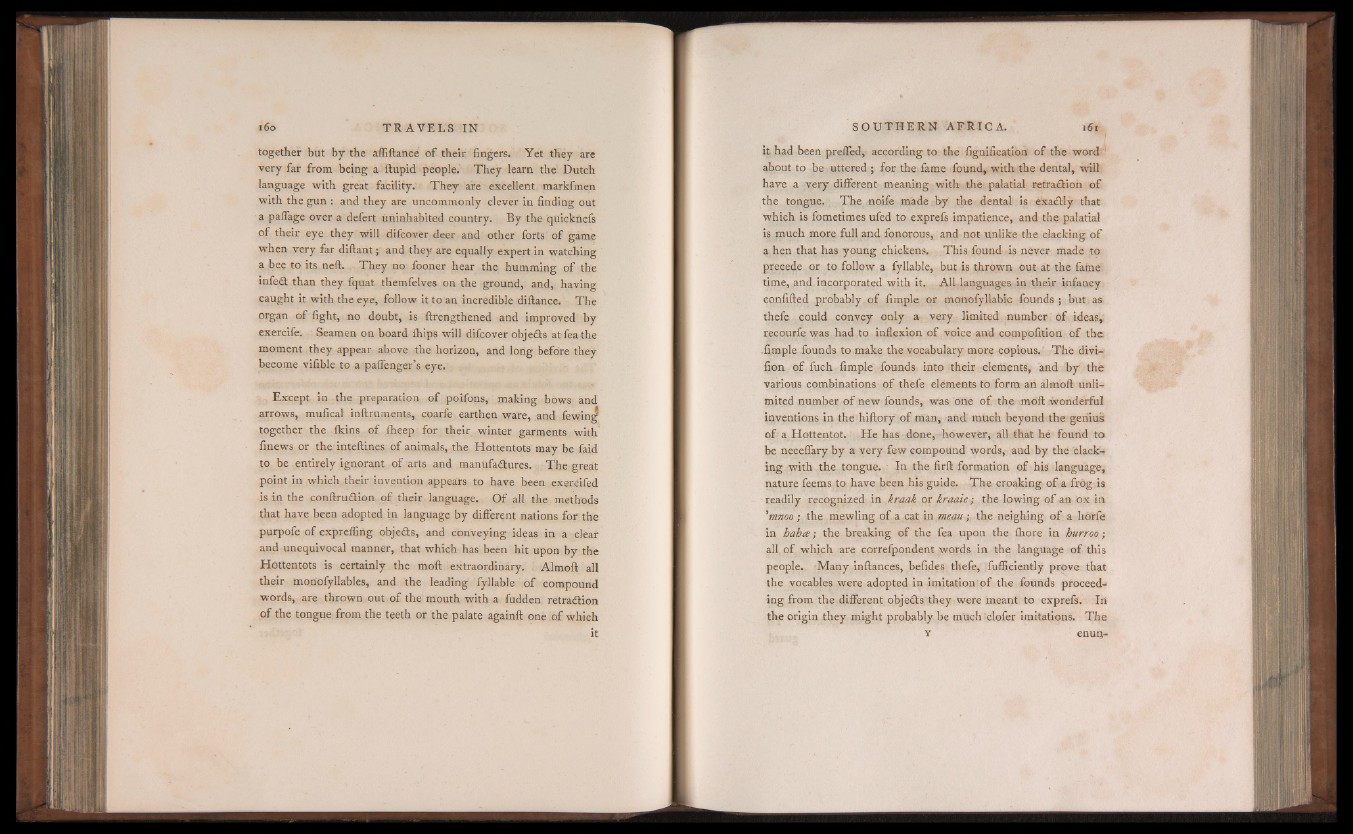
together but by the affiftance of their fingers. Yet they are
very far from being a ftupid people. They learn the Dutch
language with great facility. They are excellent markfmen
with the gun : and they are uncommonly clever in finding out
a paiTage over a defert uninhabited country. By the quicknefs
of their eye they will difcover deer and other forts of game
when very far diftant; and they are equally expert in watching
a bee to its neft. They no fooner hear the humming of the
infeft than they fquat tfiemfelves on the ground, and, having
caught it with the eye, follow it to an incredible diftance. The
organ of fight, no doubt, is ftrengthened and improved by
exercife. Seamen on board ihips will difcover obj efts at feathe
moment they appear above the horizon, and long before they
become vifible to a paflenger’s eye.
Except in the preparation of poifons, making bows and
arrows, mufical inftruments, coarfe earthen ware, and fewing
together the ikins of iheep for their winter garments with
finews or the. inteftines of animals, the Hottentots may be faid
to be entirely ignorant of arts and manufaftures. The great
point in which their invention appears to have been exercifed
is in the conftruftion of their language. O f all the methods
that have been adopted in language by different nations fo r the
purpofe of expreffing objefts, and conveying ideas in a clear
and unequivocal manner, that which has been hit upon by the
Hottentots is certainly the moft extraordinary. Almoft all
their monofyllables, and the leading fyllable of compound
words, are thrown out of the mouth with a fudden retraftion
of the tongue from the teeth or the palate againft one of which
it
it had been preffed, according to the lignification of the word
about to be uttered ; for the fame found, with the dental, will
have a very different meaning with the palatial retraftion of
the tongue. The noife made by the dental is exaftly that
which is fometimes ufed to exprefs impatience, and the palatial
is much more full and fonorous, and not unlike the clacking o f
a hen that has young chickens. This found is never made to
precede or to follow a fyllable, but is thrown out at the fame
time, and incorporated with it. All- languages in their infancy
confided probably of fimple or monofyllabic founds ; but as
thefe could convey only a very limited number of ideas,
recourfe was had to inflexion of voice and compofition of the
.fimple founds to make the vocabulary more copious. Thé divi—
fion of fuch fimple founds into their elements, and by the
various combinations of thefe elements to form an almoft unlimited
number of new founds, was one of the moft wonderful
inventions in the hiftory o f man, and mUch beyond the genius
of a Hottentot. He has done, however* all that he found to
be neceflary by a very few compound words* and by the clacks
ing with the tongue. In the firft formation of his language,
nature feems to have been his guide. The croaking of a frog is
readily recognized in kraak or kraaie ; the lowing of an ox in
’mnoo ; the mewling o f a cat in mean ; the neighing o f a horfe
in bahæ; the breaking of the fea upon the ihore in burroo ;
all of which are correfpondent words in the language of this
people. Many inftances, befides thefe, fufficiently prove that
the vocables were adopted in imitation of the founds proceeding
from the différent objefts they were meant to exprefs. In
the origin they might probably be much clofer imitations. The
y en u p -